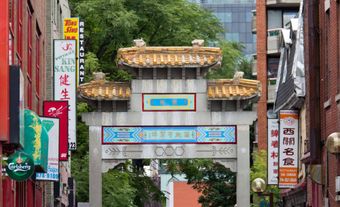In 1887, a Vancouver newsman noted the concentration of Chinese residences and businesses at the south end of Carrall Street at Dupont — now Pender Street — near the edge of False Creek. The development of “China-town,” as he called it, was recent, but Chinese had been Vancouver pioneers from the start.
Although the first documented Chinese migrants appear in British Columbia as early as 1788, it was the Cariboo Gold Rush of 1858 that saw the first major influx of Chinese men, many from California. Then, in 1882, the Canadian Pacific Railroad brought 2000 Chinese workers from Hong Kong to carve the rail line through the BC mountains. Many of those rail workers settled in what would become Vancouver.
As the city grew, the Chinese created their own enclave along Dupont Street. Between 1900 and 1901, the population of the street jumped from 1500 men to 2000 men, 27 women and 26 children. Racist immigration policies meant that few of the men could bring wives from China, so it is no wonder that the population of Chinatown was so heavily masculine.
Chinatown spread east from Carrall to Westminster Street, today’s Main Street, and beyond to become the second largest Chinese neighbourhood in North America. Although the recent boom in Richmond has shifted the Chinese population somewhat, old Chinatown remains a vital part of Vancouver’s cultural mix.
Most major cities across Canada have a Chinatown - but how did they start, and why? This episode, a look at the early history of Chinese people this side of the Pacific, and the historic Chinatown in B.C. that predates Confederation. (Hint: it's not in Vancouver.)Note: The Secret Life of Canada is hosted and written by Falen Johnson and Leah Simone Bowen and is a CBC original podcast independent of The Canadian Encyclopedia.

 Share on Facebook
Share on Facebook Share on X
Share on X Share by Email
Share by Email Share on Google Classroom
Share on Google Classroom
